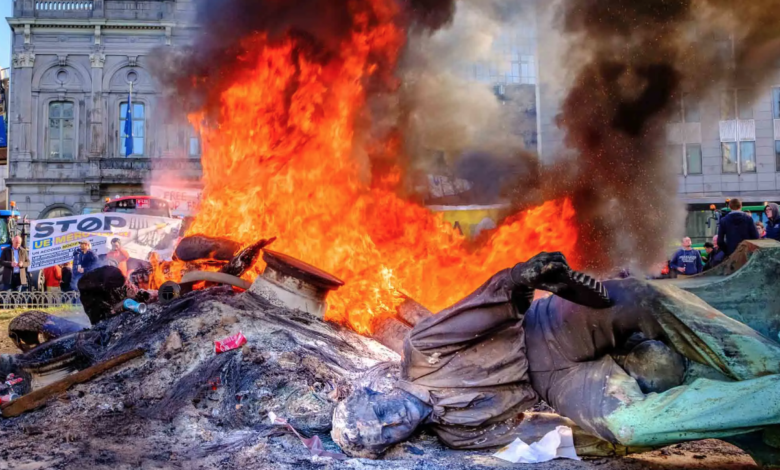Tractor protest vandalizes Brussels, EU responds with affectionate caress

Take down the statue of an English industrialist of the ‘800 in the middle of a bonfire in Place du Luxembourg, in front of the European Parliament, between angry faces, slogans and flags of Coldiretti, In the final declaration of the European Council, the tractor protest was given special mention. Mention that does not censor acts of vandalism: indeed, it gives a caress to the protesters.
It’s just a note at the end of the document, a few lines. But it expresses all the concern of the 27 faced with demonstrations that have occupied dozens of European cities recently. The anger of European farmers – to which the EU devotes 1/3 of the entire EU budget, more than EUR 350 billion, practically half of the EU Next Generation – has broken through the Palace. Also because the polls are close. And agribusiness interests have an electoral weight that no head of government wants to ignore lightly. Especially if doing so also means defending difficult and unpopular decisions like some of the Green Deal.
“The European Council discussed the challenges in the agricultural sector and the concerns expressed by farmers. Recalling the essential role of the common agricultural policy, it called on the Council and the Commission to continue their work as necessary. The European Council will continue to follow the situation”, reads point 40 of the Council’s final declaration, which mainly discussed the new aid package for Ukraine.
The Tractor protest, Coldiretti and the “green madness” of Brussels
It was the culminating act, probably not the final one, of the protest of the tractors against the measures for agriculture and livestock contained in the Green Deal, the cuts to the discounts on agricultural fuel, the excess of bureaucracy, the distance between what is paid to producers and the final prices of food. In the square in Brussels, yesterday, there were above all the acronyms of representation of Italy, Spain and Belgium. With the Italian team well-nourished.
And that it is fierce, despite the “caresses” of the Twenty-Seven and the European Commission – which the day before yesterday gave another year of Urbi et orbi derogation from measures to support biodiversity under the Gaec 8 chapter of the common agricultural policy – that is fierce is more than clear from the statements of the President by Coldiretti after the events of Place du Luxembourg.
“We have asked for the cancellation of a crazy choice of the Timmermans era”, Prandini confides today to Avvenire about the Gaec 8 norms, explaining candidly: “We want to cultivate without constraints. We got that measure suspended for 2023 because of the war, but it was preparatory to cancellation. We aim for that“.
But not only that. Coldiretti fully embraces the agenda of much of the EPP in the last year and the far-right groups in the European Parliament. Password: “reverse course on green follies“. Also on the columns of Avvenire, the face of Coldiretti lashes out against the regulation on plant protection products, the one on packaging, and of course the package on the restoration of nature “which is a big joke: what do you restore without farmers? Who will keep the ditches clean, who will control the hydrogeological instability? If the CAP is a bureaucratic burden that prevents even access to the contributions it is normal that the inland areas are depopulated, because if farmers can not support themselves with their work they must look for another”.
What Mr Prandini forgets to mention is the data on access to CAP subsidies. 80% of the funds end up in the pockets of 20% of farms, the larger ones. They carry on unsustainable business models. Protected by farmers’ unions. The latest reform of the CAP, approved in 2021, tried very timidly to change something, only to break through the barricades of the large European and national interest groups, to which the EPP and much of the PSE have joined without much hesitation. The EU Court of Auditors, then, in the latest reports on the CAP has made it clear that, as it is structured today, the subsidy system does not serve to protect biodiversity, restore soils and contribute to the ecological transition of the continent. It will be difficult to extend the derogations and remove the environmental constraints linked to the subsidies.





